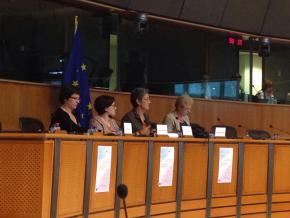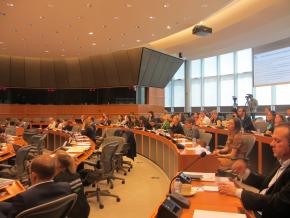The event was hosted by Ms. Ulrike Lunacek, Vice-President of the European Parliament (The Greens/EFA) and organized in the framework of the Balkan Civil Society Development Network (BCSDN). Participants of the event included members of the European Commission, representatives of the Parliament’s services and Permanent Representations of the EU Member states and members of the BCSDN.
During her opening speech, Ms. Lunacek highlighted the importance of the strong civil society in democratic countries and emphasized that enabling environment for civil society should be one of the core conditions in the EU accession process. Ms. Venera Harjullahu co-chair of the debate and BCSDN’s Board Chair added that non-state actors should play a substantial role in the EU accession negotiations.
The managing director of ECNL, Ms. Eszter Márkus presented the methodology applied by the Monitoring Matrix, as well as the in-country monitoring and Regional Report methodology. In addition, she presented the key findings of the Regional Report 2014, highlighting the most significant issues affecting civil society in the region.
The full Monitoring Matrix Regional Report 2014 is available here.
Ms. Tanja Hafner Ademi, the executive director of BCSDN, presented the recommendations for reforms on the regional level, formulated based on the key issues identified in the Regional Report. In addition, she highlighted the importance of the EU in supporting the national level advocacy for more enabling environment for civil society.
Following the panel presentations, representatives of the BCSDN member organizations took the floor to share their main concerns and observations from the 2014 in-country monitoring. Representative of the DG NEAR and other participants from the EU institutions contributed to the discussion and provided their opinions, comments and questions on the topic.
As a closing remark, Ms. Lunacek emphasized that the governments should not see civil society as opponent, but rather as an ally, whose work can contribute to the improvement of their work, strengthen the democracy and support the EU accession process.

